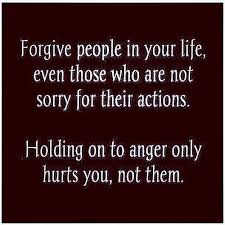
King David continues to be reacquainted with the people of the land. Just a few chapters ago (Chapter 16), we read of encounters with Ziba and Shimei. You may recall that Shimei was previously harassing David as he left Jerusalem, jeering and throwing rocks at him. Now the same man is welcoming David home.
It appears David did not hold a grudge against this man. Shimei had to believe that David would be seeking revenge for his past disrespectful behavior. We see Shimei bowing down, crying out, “My lord the king, please forgive me.”
Despite being counseled to not forgive this man, King David said clearly to Shimei, “Your life will be spared.” David was celebrating today, not executing. He could see Shimei’s earnest plea for forgiveness and any grudge was forgotten.
Can it be that easy? Have you ever held a grudge against someone for doing you wrong? Have you ever encountered that person looking for forgiveness from you? I can’t say that I have had such an experience.
There are times when I’ve confronted those who I have hurt asking for forgiveness. That can be a very powerful and emotional moment for both parties. Sometimes it takes years to muster up the courage to make amends. While it’s a scary thing, it’s a cleansing act to be sure.
We learn more details in this reading, too, about Ziba. In David’s first encounter with him in Chapter 16, Ziba told us that Saul’s son, Mephibosheth, had stayed behind in Jerusalem on purpose. We wondered what Ziba’s agenda was, and I still do. It appears Mephibosheth intended to leave and be with David, but Ziba prevented that from happening.
Now it seems that David is rethinking his original grant to Ziba. We know that his first allegiance is to protect Jonathan’s son, Mephibosheth, as he had promised his friend all those years ago. We see the importance of having David back safely trumps having land. Mephibosheth said, “I am content just to have you safely back again, my lord the king!”
So there appear to be no hard feelings there, either. When we are at odds with other people, we carry around a heaviness or oppressive spirit. It is certainly not healthy for us to hold grudges against those who have wronged us. What do we do instead?
We can seek reconciliation as Shimei did. He wasn’t the one holding the grudge, but he knew his behavior would warrant a grudge being held against him. In our recovery ministry, making amends was a very key element to the whole process.
Who are you at odds with? Is there a way to safely work things out? If your oppressor is no longer alive, the exercise we used for cleansing in our recovery ministry was to write a letter to them. That can also be done when safety is an issue, as in the case of an abuser.
When we hold a grudge or fail to forgive others, we are the ones being harmed. The other individual may not even realize they have caused us harm or that we are letting the hurt fester and hold us back from greatness.
It’s time to let go. It’s time to let God heal our brokenness.

Let’s pray …
Lord, I thank you that I have been able to forgive the main oppressor in my life. I am so grateful for the time in our recovery ministry that allowed me that opportunity. I pray for others going through similar situations of abuse. Give them the courage they need to be cleansed with the power of forgiveness. In Jesus’ name. Amen.
